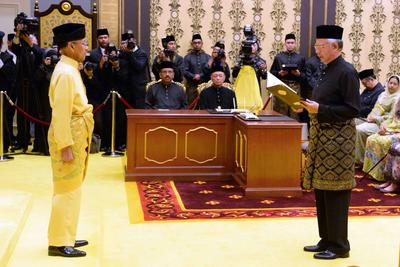Portfolio funds appear to be in good shape following the election, when they flooded Malaysian markets. The Kuala Lumpur Stock Exchange (KLSE) touched 1,774 points on 6 May 2013, up from 1,694 on 3 May 2013. As of 13 May, the KLSE moved on to hit 1,785 points. This does not necessarily indicate the markets’ confidence in a Barisan Nasional (BN) government. It could reflect to a greater extent the economic gloom of the developed world. With fund managers in search of markets in which to invest, Malaysia has proven attractive amid greater uncertainty elsewhere. Emerging markets (Malaysia included) have outperformed the United States, and the upward push in local equity markets is recognition of this achievement, and not entirely due to the BN electoral victory.
Along with the rising KLSE, Malaysia’s currency, the ringgit, has also been strengthening. Yet this may not be a blessing. If the trends in 2012 are anything to go by, there is cause for apprehension. In 2012 Malaysia’s imports grew at a faster rate than its exports. True, the trade balance was positive, but it was on a downtrend. One can justify the rapid rate of growth in imports by claiming that the Malaysian economy was rebalancing. But an export-oriented economy has to have an active growth in exports to boost its export-oriented industries, and it should be remembered that most of Malaysia’s manufacturing is export-driven.
With the fluctuations in portfolio investments, which could see a correction any time soon, and with the tentative nature of exports, there is a measure of doubt about Malaysia’s outlook. On the fiscal front, Najib has committed himself to greater expenditures, and his earlier determination to press for a balanced budget and to emphasise fiscal prudence has softened, particularly in the lead-up to the elections. For instance, BN’s manifesto had him increasing the government’s scheme of one-off cash payments, known as BR1M, up to RM1,200 (US$389) for households and RM600 (US$194) for singles, with a promise to continue the payments on an annual basis.
There is no doubt that revenues have to be generated to pay for these expenditures. The goods and services tax (GST), a politically unpopular instrument, was put on hold in Najib’s previous term in office, but it will have to be implemented during his present term. The GST will be a point of debate and an issue that will earn the ire of lower-income groups. It will be seen as a further attempt to squeeze their real incomes, worse still if perceived inflation (as opposed to official figures) is high when the tax is introduced.
The opposition will seize the opportunity to remind specific target groups, particularly the disadvantaged urban population, that alternatives exist. With respect to subsidies, the opposition has deftly won the hearts of urban residents. As part of its manifesto, the opposition promised that it would bring down the prices of petrol, diesel, electricity and water tariffs. Najib, on the other hand, argued a few years ago that subsidies are unsustainable. The opposition has claimed that with its model of government, leakages from the economy, rent-seeking and monopolies will be abolished, leaving excess funds which can then be funnelled into supporting subsidies for primary goods. This will remain a hypothetical model that cannot be tested. But it nevertheless sets a benchmark against which the present government will be judged.
Najib will have the challenging task of holding his balance between good economic policy, the political forces within and outside his party, and an unhelpful global economic climate. On the external front, Malaysian policy makers still have cause for concern. The euro zone is still in crisis and economic activity in China, a key trading partner for Malaysia, is likely to be more subdued this year. Malaysia will also have to contend with US debt issues. Understandably, it was reported in January 2013 that the World Bank has cut its global growth rates, forecasting that the world economy will grow by 2.4 per cent in 2013. But if the global economy, and China, in particular, sees softer growth this year, there will be consequences for Malaysia. Exports will slip, and so, too, will the manufacturing sector. The government will have to resort to a fiscal deficit.
Weak external demand will allow the BN’s manifesto, aptly called ‘A Promise of Hope’, a chance to extend this hope to what may otherwise be a dented economy. While some elements of BN’s manifesto may be questionable, boosting the economy through public expenditure in infrastructure, health services and public transportation may not be such a bad idea. And the effects of a less-than-vibrant global economy can be mitigated by the enactment of the manifesto.
Bleak as all this may sound, Prime Minister Najib has taken the first positive step in announcing his intention of starting the journey ahead with national reconciliation. A house that has been healed of differences and disagreement may be the best way to start.
Shankaran Nambiar is a senior research fellow at the Malaysian Institute of Economic Research.

